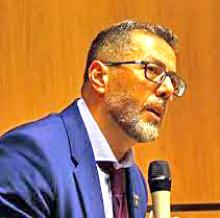You are here
Fighting Israel’s war in Jenin: Can the Palestinian Authority be saved?
Dec 31,2024 - Last updated at Jan 02,2025
The latest news from the Palestinian Authority’s (PA) so-called "Protecting the Homeland" operation in the Jenin refugee camp paints a grim picture. Nine Palestinian lives have been claimed in this ongoing crackdown which began on December 5, including a young journalist, Shaza Al Sabbagh.
The assault, as reported by the Israeli newspaper Haaretz, has, expectedly, received a stamp of approval from the Israeli occupation army, which seems content with the PA’s performance. Meanwhile, Israel’s Channel 14 confirmed that Israel has issued a clear deadline to the PA to finish the task—effectively eradicating what remains of resistance in Jenin, in the name of ending lawlessness and apprehending outlaws.
It is an irony that has become all too familiar: The Palestinian entity that was supposed to represent the will of the people and lead them towards freedom has become complicit in crushing resistance in one of the most marginalised and impoverished areas of the West Bank, all while serving the interests of Israel. This is the heart of the Palestinian paradox in the West Bank.
For years, the PA has demanded unflinching obedience from the Palestinian people in the name of preparing Palestine for sovereignty and statehood. Yet, as the years have passed, this pledge has slipped further and further away. In its place, the PA has become complicit in the expansion of Israel’s territorial control and the erosion of Palestinian rights. This might be a difficult conclusion to digest, but the killing of innocent Palestinians in Jenin at the hands of Palestinian security forces, while Israel and its settlers are cracking down on Palestinians elsewhere in the West Bank, should be all the proof needed to support the above claim.
Moreover, the PA’s strategy of appeasing Israel through ‘security coordination’ has done little to hinder Israel’s systematic land grab and the continued construction of illegal settlements. To the contrary, such “coordination”has emboldened Israel and its unruly settlers.
What is perhaps more damning is the fact that the PA has often become an active participant in the Israeli oppression of Palestinians, as is the case in Jenin today. In its role as an enforcer of Israeli policies, the PA has become a tool of the Israeli occupation, tasked with quelling political dissent and silencing critics.
The latest operation in Jenin is a clear manifestation of how Israel uses the PA to carry out its dirty work. The Jenin refugee camp, an area of less than half a square kilometre, has always been a symbol of Palestinian resistance. According to the Palestinian Ministry of Health, Israel has raided Jenin 80 times in the last year alone, killing over 220 Palestinians and wounding hundreds more. Yet, Jenin remained unbowed. To now see the PA working in concert with the Israeli army to break the will of Jenin’s 23,000 inhabitants is a deeply painful reality for most Palestinians.
What complicates this crisis even further is the silence of many Palestinian intellectuals, both in the West Bank and the diaspora, who have failed to confront the PA with the same vigor with which they criticise the Israeli occupation. But why have so many prominent voices, intellectuals, and political analysts remained mute on the issue of the PA’s betrayal of the Palestinian struggle?
The answer lies in a complex mixture of fear, political pragmatism and historical inertia. For decades, the PA has maintained a stranglehold on the political landscape of Palestinian life. It controls the levers of power, and anyone who dares to challenge its authority risks being silenced—through arrests, imprisonment, or even torture. Palestinian intellectuals, particularly those in the West Bank, are all too aware of this reality.
Additionally, there is a deep sense of paralysis within the Palestinian intellectual community in the occupied West Bank, in part due to their leadership’s failure to confront Israel over the ongoing genocide in Gaza. But there is more to this ongoing paralysis.
For years, the PA has framed itself as the “sole legitimate representative” of the Palestinian people. Many intellectuals who would normally criticise Israel’s occupation are unwilling to take on the PA for fear of further fragmenting the Palestinians. There is a deep-seated belief among some that a public confrontation with the PA would lead to greater disunity, which could play into Israel’s hands.
But this political pragmatism comes at a heavy cost. While many Palestinian intellectuals hesitate to criticise the PA, they are forced into a position of complicity with its actions. The PA’s betrayal of the Palestinian cause is no longer a matter of debate—it is a fact. Yet, by failing to confront this betrayal head-on, intellectuals and activists alike risk forfeiting their moral credibility.
In the face of Israel’s genocidal war on Gaza and unprecedentedly violent crackdowns on Palestinians in the West Bank, the betrayal of the PA has been laid bare for all to see. The PA's willingness to assist in the subjugation of Palestinians in the West Bank, while pretending to represent them, has exposed the institution like never before.
But can the PA itself be saved? The answer may not even matter. What matters is whether the Palestinian people, in their collective will and resistance, can liberate themselves from Israel’s settler colonialism and the moral corruption of their self-proclaimed leadership. The events of the coming weeks and months will be decisive.
Dr Ramzy Baroud is a journalist, author and the editor of The Palestine Chronicle. He is the author of six books. His latest book, co-edited with Ilan Pappé, is “Our Vision for Liberation: Engaged Palestinian Leaders and Intellectuals Speak Out”. His other books include “My Father was a Freedom Fighter” and “The Last Earth’. Baroud is a non-resident senior research fellow at the Centre for Islam and Global Affairs (CIGA).













Add new comment